The dos and don’ts of caravan grey water




I have a confession to make. I’ve never really understood what the big deal was with caravan grey water. As far as I was concerned, any water that goes into our parched earth has got to be better than tossing it down the drain. But for many caravanners, that’s the last place grey water should end up.
It just seems whenever the subject of caravan grey water is raised online or around a campfire, it turns into a real battle. Such is the level of emotions the subject seems to arouse. I just couldn’t understand it.
Then we started living full-time in our caravan, and I started to notice a few things. Smells from drains, grey water from other nearby caravans – and it compelled me to look into the grey water issue a bit further. As a result, I’ve had a rethink on my attitude and it’s about time all of us did the same.
Grey water is essentially any domestic wastewater that doesn’t originate from a toilet. That includes wastewater from washing machines, kitchen sinks, bathroom sinks and showers. Waste that originates from a toilet is called black water.
In a domestic or household environment, it is possible to divert grey water onto our gardens and lawns. Depending on how your household plumbing is arranged, you can select exactly what wastewater source to divert. In a caravan or motorhome, it is not generally possible to pick and choose which grey water to divert.
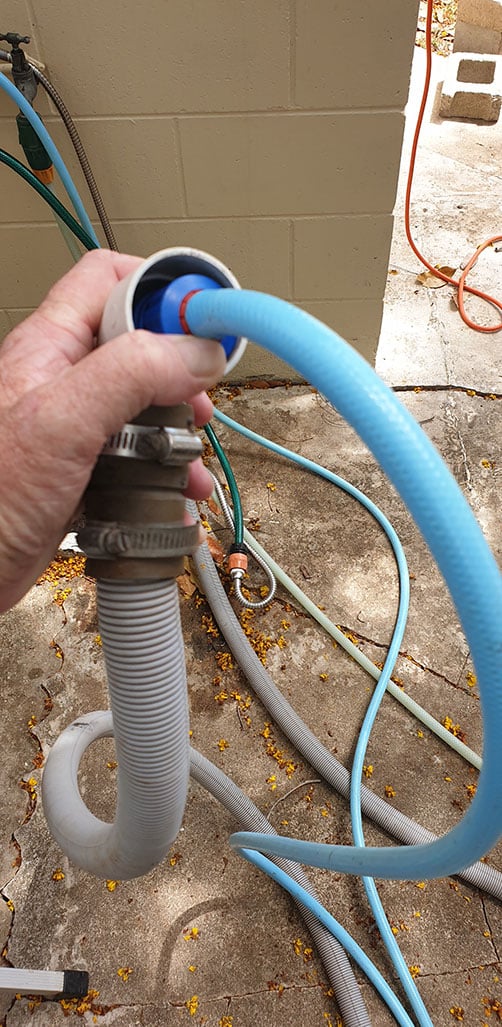
Probably the biggest issue with caravan grey water is that it doesn’t stay grey for very long. Whether you have a grey water tank or not, any grey water that is stored or remains in the plumbing of your caravan, will turn to black water within 12 to 24 hours. Maybe even quicker in the heat of the Australian summer. This is due to the rapid growth of bacteria in the warm and confined conditions.
Other organic material, such as dead skin, hair, and food scraps, adds its own bacteria. This material can get trapped in the bends and crevices of the plumbing, causing noxious smells to develop. Depending on where your grey water hose runs off, this can make life for your neighbours quite unpleasant. There may also be some chemicals in your grey water, such as soaps and cleaning products, that may be harmful to the environment.
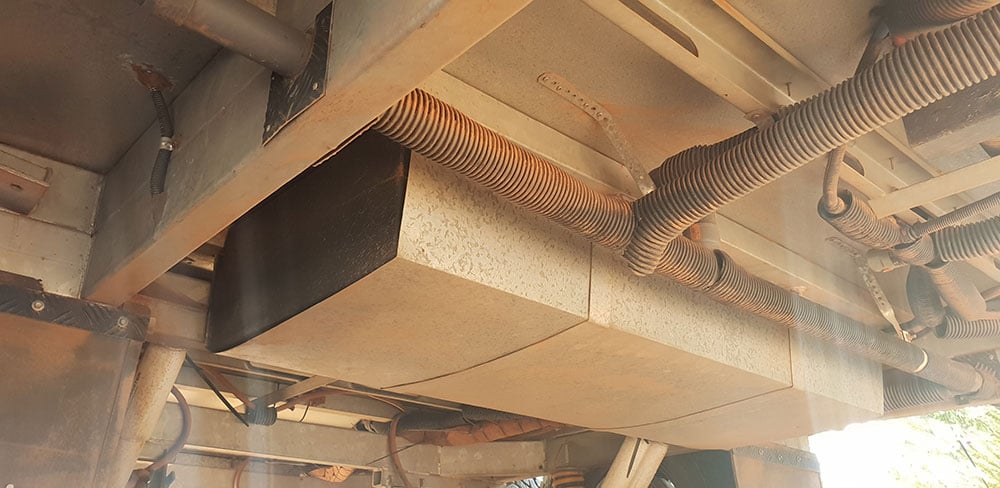
Many campsites require RVs to be fully self-contained. That normally means the ability to store grey water until such time as you leave the area. To store grey water, you will need a tank of some description. Most modern caravans and motorhomes are equipped with inbuilt grey water tanks that are integrated into the plumbing. Many function by diverting the flow from the grey water outlet into the tank via a manually operated valve.
Alternatively, many owners choose to retro-fit a tray water tank to their caravan or motorhome. Others may choose to use an external portable grey water tank. Some are nothing more than a large plastic bottle that collects grey water flow from the outlet. Others are purpose designed and have trolley wheels allowing the wastewater to be easily transported to a disposal site.
If you’re using an external or portable grey water tank, it is worth checking to see if the design conforms with the definition of self-contained for the particular campsite you’re intending to visit. Many only allow integrated grey water tanks.
This is where the issue becomes somewhat contentious as the rules may vary depending on where you are or even the conditions that exist at the time. Whatever you do, it’s illegal to dump grey water onto the road as you drive. If what you’re dropping is now black water anyway, it’s going to end up in a waterway somewhere, and the EPA doesn’t approve. You may argue that it’s diluted, but you’re splitting hairs and displaying your attitude to the topic. Don’t drop your caravan grey water anywhere but a drain or where directed to on private land.
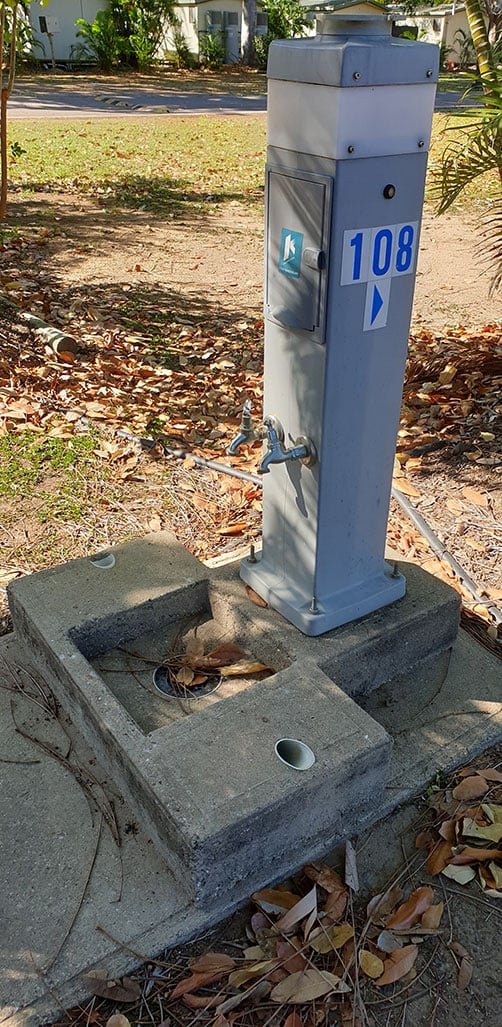
As a rule, most caravan parks will provide a grey water drain where visitors can direct their grey water using their outlet hoses. Some are purpose-built drains into which the grey water hose outlet is inserted. Others may be no more than an open drain in which the grey water hose outlet just sits.
You will also find many caravan parks do not provide a grey water disposal system and instead may simply request you to direct grey water onto the grass or garden surrounding your site. We find it is a good idea to check with the park reception as to how they want their guests to dispose of grey water. If they are in drought, they may prefer your grey water to flow onto their gardens rather than down the drain.
It would be extremely rare for free camping areas to provide any disposal systems for grey water. Unless they are signposted otherwise, grey water can be allowed to run onto the ground. In these cases, you need to be very considerate of other campers in your vicinity and place the grey water hose outlet in such a position that it doesn’t affect anyone else around you. You should apply the same courtesy everywhere really.
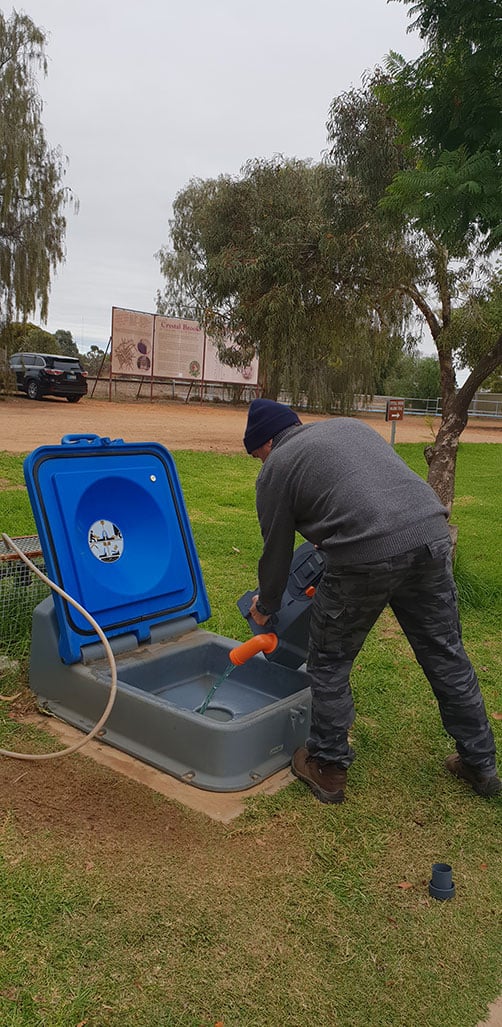
If you have a grey water tank in your caravan or motorhome and it is full, you’re going to need to dispose of the contents. As we saw earlier, stored grey water doesn’t stay grey for long and it is best considered and handled as if it was black water. That means storing it until you reach a public dump point. That is the best way to dispose of stored grey water.
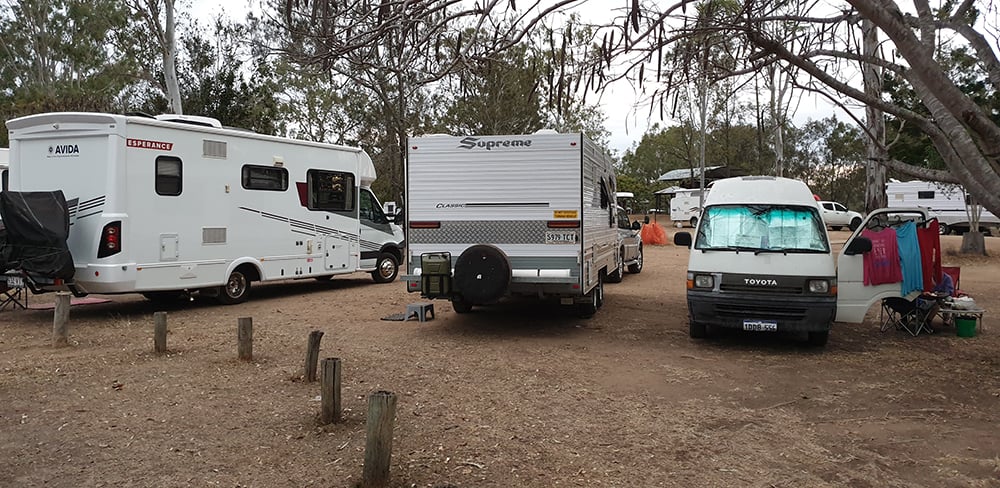
There’s no way we can magically convert our caravan grey water into clean drinking water, but we can make it less offensive and better for the environment by doing the following:
So now you know the dos and don’ts with caravan grey water, you can travel safe in the knowledge that you’re doing the right thing.
I know a lot of people will shout me down. But when near the end of a trip I save the black and grey water to use at home. The black water is so good at boosting bally spots in my yard. Just carefully pour it on a bally spot,add water and in no time the grass has a really healthy boost. I think the whole grey water black water scenario is over blown by do gooders! We use a truly environmentally friendly blackwater additive which does not kill everything as do some with green additive credentials. I suggest you do a MSDS to the next (second) level on some of these well known black water additives and you will be disgusted. They should be held accountable for saying they are environmentally friendly (formaldehyde)!.
Goodmorning Marty, i read your articles on grey water disposal with great interest, it was nice to read an informative piece, we’ve developed a product that i believe could solve much of this problem by using an Eco-friendly approach that’s simple especially for those of us that love getting off grid. The system involves transferring the Grey Water as it’s used so as to allow it to be used in its good state (not black) for simple irrigation, rather than dumping in one spot causing land gouging and ponding, all ways our host’s worst left nightmare especially near pristine water courses. We’d love to send you one of our units to try/keep and would appreciate any feedback you could give us. if you can give me a forwarding address, we’ll get one to you in time for perhaps an Easter trip, i look forward to future contact with you, feel free to give me a call or email any time, our web site is in the final trimming stages and should appear with the release early June………………All the Best………..Greg Kelly
Morning Marty, just following up to let you and the readers know that our Grey water transfer system is up and running, the web site has all the information, if you’d like a “Well” to trial and give us some feed back/review before Easter send me a forwarding address and we’ll get one to you and some accessories……………..Cheers……….Greg Kelly………..P.S. you can leave any messages at our email address………..info@thepumpwell.com.au
Morning Marty, just following up to let you and the readers know that our Grey water transfer system is up and running, the web site has all the information, if you’d like a “Well” to trial and give us some feed back/review before Easter send me a forwarding address and we’ll get one to you and some accessories……………..Cheers……….Greg Kelly………..P.S. you can leave any messages at our email address………..info@thepumpwell.com.au